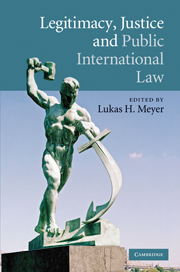Book contents
- Frontmatter
- Contents
- List of contributors
- Acknowledgements
- Introduction: Legitimacy, justice and public international law. Three perspectives on the debate
- 1 The legitimacy of global governance institutions
- 2 Institutionalising global demoi-cracy
- 3 The responsibilities and legitimacy of economic international institutions
- 4 Do international organisations play favourites? An impartialist account
- 5 ‘Victors’ justice'? Historic injustice and the legitimacy of international law
- 6 International law and global justice
- 7 Global justice: Problems of a cosmopolitan account
- 8 The responsibility to protect human rights
- 9 The threat of violence and of new military force as a challenge to international public law
- 10 Forcing a people to be free
- Index
- References
4 - Do international organisations play favourites? An impartialist account
Published online by Cambridge University Press: 03 May 2010
- Frontmatter
- Contents
- List of contributors
- Acknowledgements
- Introduction: Legitimacy, justice and public international law. Three perspectives on the debate
- 1 The legitimacy of global governance institutions
- 2 Institutionalising global demoi-cracy
- 3 The responsibilities and legitimacy of economic international institutions
- 4 Do international organisations play favourites? An impartialist account
- 5 ‘Victors’ justice'? Historic injustice and the legitimacy of international law
- 6 International law and global justice
- 7 Global justice: Problems of a cosmopolitan account
- 8 The responsibility to protect human rights
- 9 The threat of violence and of new military force as a challenge to international public law
- 10 Forcing a people to be free
- Index
- References
Summary
The recent turn of politics and philosophy to serious appraisals of international law is welcome news for politics, ethics and law. Politics can offer us rich description of the international landscape – the actors and their policies, conflicts and approaches to overcoming them; and political and moral philosophy can produce reasoned prescription for devising a just world order. But international law is a critical bridge between them, for law, with its grounding in the institutional arrangements devised by global actors, provides a path to implementing theories of the right or of the good. Just as scholars of politics have realised that their descriptions must include the norms and decision-making processes of international law, so scholars of international justice are taking account of the norms already institutionalised within the international order. Ethical discourse must understand these institutions, for they both place constraints upon and offer opportunities for carrying out the solutions to ethical problems that philosophers derive. Such an understanding is key not only to making international ethics stronger within philosophy, but to making it convincing to those concerned with operationalising ethical theory – political scientists, legal academics, governmental and non-governmental elites and the educated public.
Beyond institutions, the connection between international law and ethics is also tied to international law's own claim to morality. As Andrew Hurrell has put it, ‘the ethical claims of international law rest on the contention that it is the only set of globally institutionalised processes by which norms can be negotiated on the basis of dialogue and consent, rather than being simply imposed by the most powerful’.
- Type
- Chapter
- Information
- Legitimacy, Justice and Public International Law , pp. 123 - 162Publisher: Cambridge University PressPrint publication year: 2009
References
- 1
- Cited by



